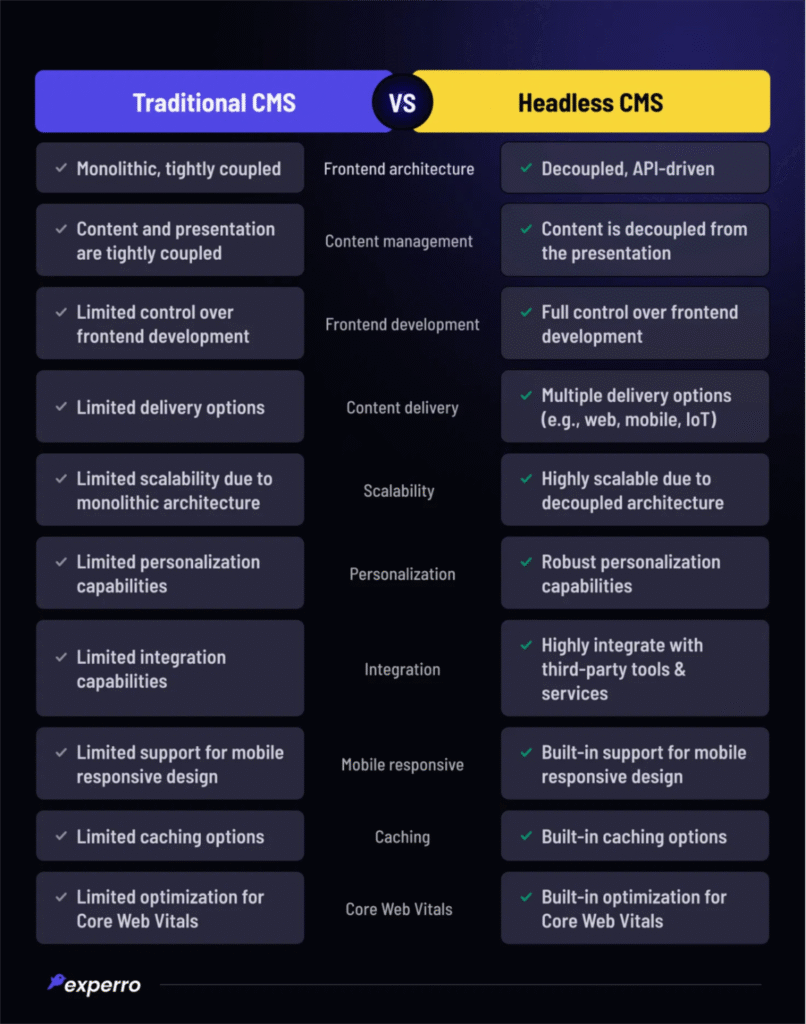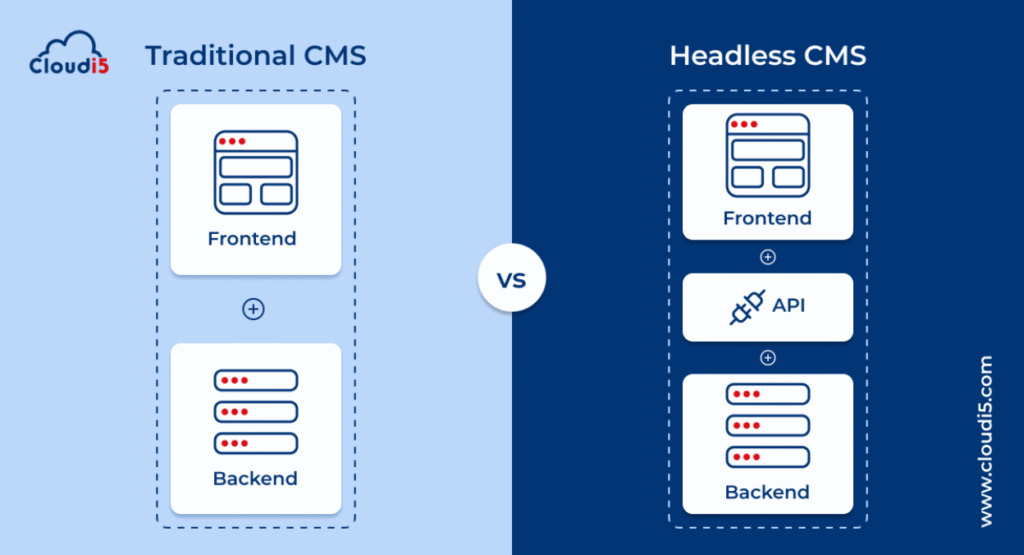WordPress vs Headless CMS: Which is the right CMS platform for Indian eCommerce businesses?
Both WordPress and headless CMS are currently popular in the Indian market. Both come with a specific level of ease of use and endless features for users.
While WordPress stands ahead with its ease of use, the headless CMS has a clear win thanks to its architecture.
Read this blog post if you’re wondering which CMS is most used for Indian eCommerce businesses and what would be best suited for your platform.
WordPress vs Headless CMS: Key Differences

The key difference between these two popular CMS platforms depends on how both content and their architecture are delivered.
WordPress typically works like an all-in-one solution to CMS, where the front end and the back end are coupled tightly.
But there’s a difference in how headless CMS works. It separates both the backend of the content management system and the presentation. Simply put, the headless CMS separates both the backend and the front end. It showcases content on different platforms through an API.
If you’re managing an eCommerce platform, here are a few different aspects of both types of content management systems for you to know:
Content Architecture

As said above, the WordPress vs Headless CMS difference starts at the content management level. Both CMS platforms operate differently.
WordPress takes a traditional approach to bind both the content backend and the representation (front) of the website.
On the contrary, the headless CMS works by separating both. Content here is managed independently of the front end, and the users can access it via an API integrated into the platform.
Flexibility
When it comes to solving modern user experience problems, WordPress CMS might slow down a little and fall behind. Here’s the reason: WordPress doesn’t separate the front end and back end as a CMS. Yes, there are multiple themes and plugins available for free customization. However, building eCommerce websites on WordPress doesn’t offer much flexibility compared to headless commerce.
With a clear contrast, Headless CMS stays ahead, allowing the users to choose any frontend technology for purpose-driven customization. So, if you want to use React, Angular, Vue.js, etc. for the website, there’s nothing stopping you.
It’s highly important to be considerate about WordPress vs Headless CMS if you’re building an eCommerce platform, and the present difference is detrimental to your design choices. With a headless CMS, users can prepare and optimize content for different website platforms without any friction.
Ease of Use
If you’re from a non-technical background and want to manage a website, WordPress is at an upper hand. It’s a completely non-code CMS to handle, with endless plugins, themes, and support forums backing you up. WordPress has a strong community and ecosystem to use.
On the contrary, headless CMS is more complex in nature. If you’re considering WordPress vs Headless CMS as a non-tech eCommerce owner, make your choice easier by choosing WordPress. A headless CMS requires a strong understanding of the web development norms to build, deploy, and manage the front end.
Customization
WordPress vs. Headless CMS comparison leads to a tie when comparing in terms of their customization parameters. Both CMS platforms provide a large number of customizations.
WordPress has a huge range of customizable plugins, themes, and resources. However, the process becomes cumbersome and sometimes resource-heavy if you keep relying on multiple plugins and themes, limiting the WordPress ecosystem.
On the other hand, the Headless CMS is highly customizable. Developers are completely free to use different types of programming languages, hosting platforms, and frameworks of their choice. This facilitates the creators with more flexibility and creative choices.
Scalability
WordPress vs Headless CMS: Wondering which is the best CMS platform for your eCommerce website? It’s best to consider scalability as one of your parameters for choosing either.
WordPress can scale faster with the right hosting platform and optimization techniques. But, as we said earlier, the more plugins you add, the slower and cloggier it becomes.
Well, the front end and the back end of headless CMS platforms are separate. This provides this CMS with a great advantage in optimization. The content management and delivery process is smoother with this type of CMS. When it comes to handling high traffic and projects, the headless CMS has a clear win.
Performance
When choosing a CMS for your eCommerce platform, it’s essential to choose a CMS that performs better. While WordPress is great for blogging, it requires many plugins to stay ahead as a business. Ultimately, adding more plugins leads to a slower website that’s not efficient for eCommerce SEO best practices.
Headless CMS showcases a stark difference from the WordPress CMS in terms of performance. Since it serves the website through an API, it’s easy to keep the website performing at an optimum level.
Plus, the modern frontend frameworks are a blessing in the web development industry, allowing websites to load faster than we dreamed of. The headless CMS has better potential in terms of performance as well.
Security
WordPress is undoubtedly a popular CMS and has been around for a while. Thanks to its accessibility to everyone with a longer time in the industry, it makes an eCommerce platform an easy target for hackers. Website developers must maintain constant vigilance and attention to keep WordPress eCommerce platforms secure.
On the contrary, with the front and backends decoupled, headless CMS platforms aren’t directly exposed to cybersecurity risks. There’s no need to worry about plugins and themes compromising the website’s security.
What’s the Top priority for Indian Businesses?
WordPress vs Headless CMS: What’s the common choice among top Indian eCommerce platforms? Well, Headless CMS seems to be leading the way, with most Indian businesses adopting Shopify Plus, Magento, and BigCommerce Enterprise CMS.
While WooCommerce Integration is great for small eCommerce brands that aren’t scaling the platform yet, the future of eCommerce web development is largely built on headless CMS.
Companies are looking at robust headless CMS capabilities when deciding on a CMS for their eCommerce platform. Additionally, famous eCommerce web development platforms are helping businesses build purpose-driven eCommerce websites using the headless features of Magento or Shopify. Do you think Headless eCommerce CMS has the upper hand over WordPress? Share your thoughts with us in the comments section.






